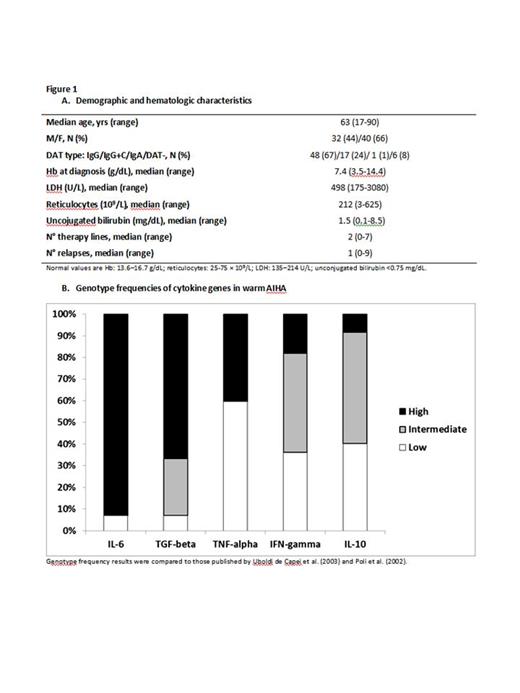Abstract
Background: Autoimmune hemolytic anemia (AIHA) is due to an increased immune peripheral destruction of red blood cells. The disease is characterized by high heterogeneity regarding anemia severity, treatment requirement and occurrence of complications. It has been shown that Hb levels at baseline, presence of complement activation, and the degree of bone marrow compensation are the main predictors of outcome. Moreover, multi-relapsing cases show bone marrow dysmyelopoiesis, and fibrosis suggesting an immune attack against bone marrow precursors. An interesting area to investigate is the genetic landscape of AIHA, including cytokine gene signature and other molecular mechanisms of refractoriness.
Aim: To evaluate the frequency of cytokine single nucleotide polymorphisms (SNPs) in warm AIHA and their correlation with clinical and hematological parameters, including the degree of anemia, treatment refractoriness and number of therapies lines.
Methods: We investigated SNPs of five cytokine genes [tumour necrosis factor (TNF)-alpha, interferon (IFN)-gamma, transforming growth factor (TGF)-beta, interleukin (IL)-6 and IL-10] in 72 Italian warm AIHA patients, using the Cytokine Tray (One Lambda, Canoga Park, CA) according to the manufacturer's recommendations. Allele and genotype frequency results were compared to those described in the Italian population by Uboldi de Capei et al. (2003) and Poli et al. (2002).
Results: Seventy-two warm AIHA patients have been evaluated: median age 63 years (range 17-90), classified as per DAT positivity in IgG+ (N=48), IgG+C (N=17), IgA+ (N=1), and DAT negative AIHA (N=6). Demographic and hematological characteristics of patients are described in Figure 1A. Regarding cytokine SNP frequencies, we observed that AIHA patients had a significantly higher prevalence of the TNF-alpha-308 high producers genotypes (G/G and G/A) compared to controls (40.3% vs 16% or 23%, p=0.0003 and p=0.006, respectively). No differences were detected regarding genotype frequencies of the other cytokine SNPs (Figure 1B). By dividing patients according to anemia severity at onset, a more frequent low producer genotype of IFN-gamma (A/A) was observed in patients with Hb levels >7.4 g/dL (median value of patients cohort) compared to the other group (p=0.05). Finally, considering the number of relapses or therapy lines, an increased frequency of TNF-alpha -308 high producers genotypes were found among multi-relapsing (> 3 relapses, 70.5% vs 56%) and multi-treated patients (> 3therapy lines, 52% vs 35%), although not significantly.
Conclusions: These preliminary data show that wAIHA patients display a more pro-inflammatory cytokine signature at molecular level as compared to the Italian control population. This is highlighted by an increased prevalence of TNF-alpha high producer genotype that is also associated with multiple relapses and greater treatment requirement. Additionally, cytokine SNPs may be also associated with anemia severity at onset, as observed for IFN-gamma low producer genotype that was more frequent in less severe cases.
Fattizzo: Alexion, Amgen, Annexon, Apellis, Grifols, Novartis, Momenta: Consultancy, Speakers Bureau. Bianchi: Agios pharmaceutics: Consultancy, Membership on an entity's Board of Directors or advisory committees. Barcellini: Agios: Honoraria, Research Funding; Bioverativ: Membership on an entity's Board of Directors or advisory committees; Novartis: Honoraria; Alexion Pharmaceuticals: Honoraria; Incyte: Membership on an entity's Board of Directors or advisory committees.


This feature is available to Subscribers Only
Sign In or Create an Account Close Modal